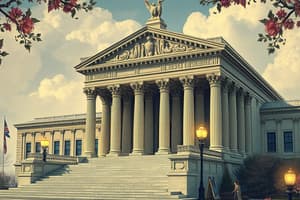Podcast
Questions and Answers
What is marble cake federalism also known as?
What is marble cake federalism also known as?
- Dual Federalism
- Layer Cake Federalism
- Cooperative Federalism (correct)
- Centralized Federalism
What does layer cake federalism indicate?
What does layer cake federalism indicate?
Distinct layers of government, each with their own sphere of influence.
The Equal Protection Clause allows states to enforce laws that abridge citizens' privileges and immunities.
The Equal Protection Clause allows states to enforce laws that abridge citizens' privileges and immunities.
False (B)
What does the Due Process Clause prohibit?
What does the Due Process Clause prohibit?
What does the Supremacy Clause establish?
What does the Supremacy Clause establish?
What is the purpose of the Full Faith and Credit Clause?
What is the purpose of the Full Faith and Credit Clause?
What is a mandate in politics?
What is a mandate in politics?
What is direct democracy?
What is direct democracy?
What does the Necessary and Proper Clause allow Congress to do?
What does the Necessary and Proper Clause allow Congress to do?
What is the General Welfare Clause?
What is the General Welfare Clause?
What was the 3/5th Compromise?
What was the 3/5th Compromise?
Who were the Federalists?
Who were the Federalists?
What did the Anti-Federalists oppose?
What did the Anti-Federalists oppose?
What is a block grant?
What is a block grant?
What is judicial review?
What is judicial review?
Who was James Madison?
Who was James Madison?
Who was Thomas Jefferson?
Who was Thomas Jefferson?
Who was Alexander Hamilton?
Who was Alexander Hamilton?
Who was John Locke?
Who was John Locke?
What was the Virginia Plan?
What was the Virginia Plan?
What was the New Jersey Plan?
What was the New Jersey Plan?
What were the Articles of Confederation?
What were the Articles of Confederation?
What does Article I establish?
What does Article I establish?
What does Article II establish?
What does Article II establish?
What does Article III establish?
What does Article III establish?
What does Article IV outline?
What does Article IV outline?
What is Federalist Paper #10 about?
What is Federalist Paper #10 about?
What is the focus of Federalist Paper #51?
What is the focus of Federalist Paper #51?
What was the argument of Brutus #1?
What was the argument of Brutus #1?
What are enumerated powers?
What are enumerated powers?
What are expressed powers?
What are expressed powers?
What are implied powers?
What are implied powers?
What is the 2nd Amendment?
What is the 2nd Amendment?
What does the 10th Amendment state?
What does the 10th Amendment state?
What does the 14th Amendment guarantee?
What does the 14th Amendment guarantee?
What did McCulloch v. Maryland establish?
What did McCulloch v. Maryland establish?
What was the outcome of Charles River Bridge v. Warren Bridge?
What was the outcome of Charles River Bridge v. Warren Bridge?
What principle did Marbury v. Madison establish?
What principle did Marbury v. Madison establish?
What did McDonald v. Chicago determine?
What did McDonald v. Chicago determine?
What did Obergefell v. Hodges rule?
What did Obergefell v. Hodges rule?
What is an ex post facto law?
What is an ex post facto law?
What are unfunded mandates?
What are unfunded mandates?
What is a writ of habeas corpus?
What is a writ of habeas corpus?
What is extradition?
What is extradition?
What are political factions?
What are political factions?
Flashcards are hidden until you start studying
Study Notes
Federalism Concepts
- Marble Cake Federalism: Represents cooperative federalism where federal and state governments collaborate on various issues.
- Layer Cake Federalism: Depicts distinct levels of government, each with its own roles; the federal government acts as the icing binding yet separating the state layers.
Important Constitutional Clauses
- Equal Protection Clause: Prohibits states from denying any person equal protection of the laws, directly addressing civil rights and liberties.
- Due Process Clause: Embedded in the Fifth and Fourteenth Amendments, forbids arbitrary denial of life, liberty, or property by the government without lawful procedures.
- Supremacy Clause: Establishes that federal law takes precedence over state law, creating a hierarchy in legal authority.
- Full Faith and Credit Clause: Mandates states to respect the public acts, records, and judicial proceedings of other states.
Political Concepts
- Mandate: Authority granted by constituents for representatives to act on their behalf; fundamental for democratic governance.
- Direct Democracy: A system where citizens participate directly in policymaking instead of through elected representatives.
Constitutional Powers
- Necessary and Proper Clause (Elastic Clause): Allows Congress to create laws deemed necessary for executing its enumerated powers.
- General Welfare Clause: Authorizes the government to enact laws that promote the general welfare of its citizens.
Historical Compromises
- 3/5th Compromise: Agreement during the Constitutional Convention to count three-fifths of the slave population for tax and representation purposes.
Political Parties and Movements
- Federalists: Advocated for a strong central government, dominating early U.S. politics from 1789 to 1801.
- Anti-Federalists: Opposed stronger federal government and the ratification of the Constitution, favoring state authority.
Legislative Framework
- Block Grant: Federal funds provided to state and local governments for broad purpose programs.
Judicial Concepts
- Judicial Review: The ability of the judiciary to invalidate legislative and executive actions deemed unconstitutional.
Founding Fathers
- James Madison: Known as the "Father of the Constitution," he advocated for governance through checks and balances.
- Thomas Jefferson: Criticized strong central government; promoted states' rights and individual liberties.
- Alexander Hamilton: Advocated for a strong national government and believed state governments should be phased out.
- John Locke: Influential Enlightenment thinker, emphasized separation of powers and the authority of the legislature.
Constitutional Articles
- Articles I-III: Establish the legislative, executive, and judicial branches of government, respectively.
- Article IV: Details the relations among states and between states and the federal government.
Influential Papers
- Federalist Paper #10: Discussed the balance of majority rule and minority rights in a large republic.
- Federalist Paper #51: Examined the importance of checks and balances within the government structure.
- Brutus #1: Criticized federal power, raising concerns about the Necessary and Proper Clause and the Supremacy Clause.
Types of Powers
- Enumerated Powers: Explicitly listed powers granted to Congress, primarily in Article I, Section 8.
- Expressed Powers: Specific powers granted by the Constitution including coining money and declaring war.
- Implied Powers: Powers not explicitly stated but necessary to implement expressed powers.
Amendments
- 2nd Amendment: Protects the right to keep and bear arms.
- 10th Amendment: Reserves powers not delegated to the federal government to the states or the people.
- 14th Amendment: Guarantees citizenship rights and equal protection under the law.
Landmark Supreme Court Cases
- McCulloch v. Maryland: Defined the relationship between federal and state legislative powers.
- Marbury v. Madison: Established the principle of judicial review.
- McDonald v. Chicago: Incorporated the Second Amendment against the states through the Fourteenth Amendment.
- Obergefell v. Hodges: Affirmed the right to marry for same-sex couples.
Legal Principles
- Ex Post Facto Law: Laws that retroactively change criminal consequences.
- Unfunded Mandates: Federal laws requiring state or local governments to perform functions without funds provided.
- Writ of Habeas Corpus: Legal order compelling the production of an individual in custody in court.
- Extradition: Process of delivering an accused person from one jurisdiction to another.
Political Factions
- Political Faction: Subgroups within a political party with differing beliefs, often acting to influence party dynamics and policy.
Studying That Suits You
Use AI to generate personalized quizzes and flashcards to suit your learning preferences.




